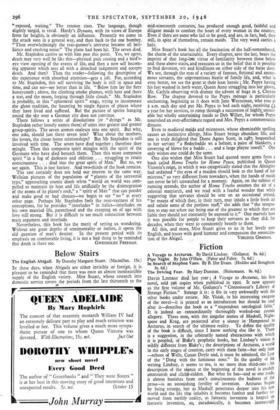Below Stairs
The English Abigail. By Dorothy Margaret Stuart. (Macmillan. 15s.) IN these days, when Abigails are either invisible or foreign, it is pleasant to be reminded that there was once an almost inexhaustible supply of the English variety. Miss Stuart, whose research into domestic service covers the periods from the late thirteenth to the
41e.
mid-nineteenth centuries, has produced enough good, faithful and diligent maids to comfort the heart of every woman in the country. Even if there are some who fail to be good, and are, in fact, bad, they still, in-spite of themselves, remain maids. The very word carries a halo.
Miss Stuart's book has "all the fascination of the half-remembered, the charm of the unattainable. Every chapter, save the last, bears the imprint of that long-lesit virtue of familiarity between those below and those above stairs, and reassures us in the belief that it is possible to find devotion, wit and kindliness on either side of the baize door. We see, through the eyes of a variety of famous, fictional and anony- mous servants, the unpretentious bustle of family life, and, what is even better, we see the great at their least heroic ; Mr. Pepys having his feet washed in herb water, Queen Anne struggling into her gloves, Mr. Carlyle observing with dismay the advent of bugs in 5, Cheyne Row. The chapter devoted to the Pepys ménage is particularly enchanting, beginning as it does with Jane Wayneman, who rose at 2 a.m. each day and put Mr. Pepys to bed each night, receiving £3 a year for her services, to romp through a succession of highly.unsuit- able but wholly entertaining maids to Deb Willett, for whom Pepys nourished an over-affectionate regard and Mrs. Pepys a commensurate distaste.
Even to medieval maids and mistresses, whose abominable spelling causes an instinctive allergy, Miss Stuart brings abundant life, and one is truly delighted that Dame Agnes Scott, in 1487, bequeathed to her servant " a ffederbedde wt a bolster, a paire of blanketts, a coveryng of blewe for a bedde . . and a large playne towel" One only wishes one could do the same.
One also wishes that Miss Stuart had quoted more gems from a book called Home Truths for Home Peace, publiihed in Queen Victoria's reign, in which it was categorically stated that the Almighty had ordained " the eyes of a maiden should look to the hand of her mistress," so very different from nowadays, when the hands of maids can never be left unwatched for a moment. Again, on the subject of running errands, the author of Home Truths assumes the air of a celestial matriarch, and we read with a fearful wonder that while suggesting that servants 'should be sent on an occasional errand, " by means of which they, in their turn, may inhale a little fresh air and exhale some of the perilous stuff," she adds that "the tempta- tion to stay out when out being one of the greatest to which they are liable they should not constantly be exposed to it." One marvels how it was possible for people to keep their servants as they did, for decades, when they were so consistently beastly to them. All this, and more, Miss Stuart gives to us in her lovely easy English, and traces with good- humour and compassion the emancipa-


























 Previous page
Previous page